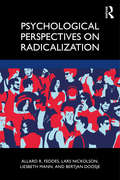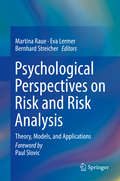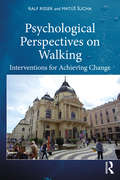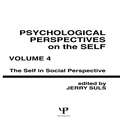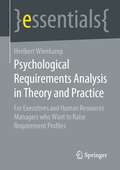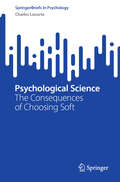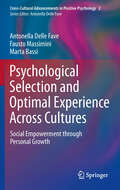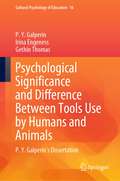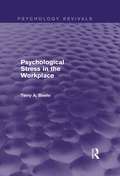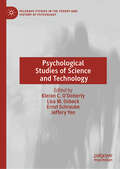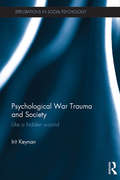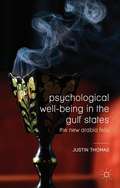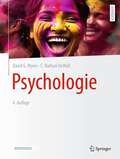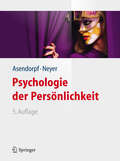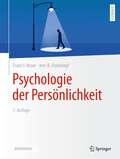- Table View
- List View
Psychological Perspectives on Radicalization
by Bertjan Doosje Allard R. Feddes Lars Nickolson Liesbeth MannThis innovative book examines radicalization from new psychological perspectives by examining the different typologies of radicalizing individuals, what makes individuals resilient against radicalization, and events that can trigger individuals to radicalize or to deradicalize. What is radicalization? Which psychological processes or events in a person's life play a role in radicalization? What determines whether a personal is resilient against radicalization, and is deradicalization something that we can achieve? This book goes beyond previous publications on this topic by identifying concrete key events in the process of radicalization, providing a useful theoretical framework that summarizes the current state-of-the-art research on radicalization and deradicalization. A model is presented in which a distinction is made between different levels of radicalization and deradicalization, with key underlying psychological needs discussed: the need for identity, justice, significance, and sensation. The authors also describe what makes people resilient against messages from "the outside world" when they belong to an extremist group and discuss observable events which may "trigger" a person to radicalize (further) or to deradicalize. Including real-world examples and clear guidelines for interventions aimed at prevention of radicalization and stimulation of deradicalization, this is essential reading for policy makers, researchers, practitioners, and students interested in this crucial societal issue.
Psychological Perspectives on Religion and Religiosity
by Benjamin Beit-HallahmiIs religion to blame for deadly conflicts? Should religious behaviour be credited more often for acts of charity and altruism? In what ways are religious and ‘spiritual’ ideas, practices and identities surviving and changing as religion loses its political power in those parts of the world which are experiencing increasing secularization? Written by one of the world’s leading authorities on the psychology of religion and social identity, Psychological Perspectives on Religion and Religiosity offers a comprehensive and multidisciplinary review of a century of research into the origins and consequences of religious belief systems and religious behaviour. The book employs a unique theoretical framework that combines the ‘new’ cognitive-evolutionary psychology of religion, examining the origins of religious ideas, with the ‘old’ psychology of religiosity, which looks at correlates and consequences. It examines a wide range of psychological variables and their relationship with religiosity. It is also provides fresh insights into classical topics in the psychology of religion, such as religious conversion, the relevance of Freud’s ideas about religion and religiosity, the meaning of secularization, and the crucial role women play in religion. The book concludes with the author’s reflections on the future for the psychology of religion as a field. Psychological Perspectives on Religion and Religiosity will be invaluable for academic researchers in psychology, sociology, anthropology, political science, economics, and history worldwide. It will also be of great interest to advanced undergraduate students and graduate students across the social sciences.
Psychological Perspectives on Risk and Risk Analysis: Theory, Models, and Applications
by Martina Raue Eva Lermer Bernhard StreicherThis authoritative collection goes beyond economic statistics and probability data to offer a robust psychological understanding of risk perception and risk taking behavior. Expert contributors examine various risk domains in life, and pinpoint cognitive, emotional, and personality factors contributing to individual differences in risk taking as well as the many nuances social demographics (e.g., culture, gender) bring to risk decisions. Coverage takes competing theories and studies into account to identify mechanisms involved in processing and acting on uncertainty. And implications and applications are demonstrated in varied fields, from updated risk models for the insurance sector to improved risk communication in health services to considering risk perception in policy decisions. A sampling of the topics: Personality and risk: beyond daredevils—risk taking from a temperament perspective.Cognitive, developmental, and neurobiological aspects of risk judgments.The group effect: social influences on risk identification, analysis, and decision-making.Cognitive architectures as a scaffolding for risky choice models.Improving understanding of health-relevant numerical information.Risk culture as a framework for improving competence in risk management. Psychological Perspectives on Risk and Risk Analysis will be of great interest to researchers in and outside of psychology, including decision-making experts and behavioral economists. Additionally, this volume will appeal to practitioners who often have to make risky decisions, such as managers and physicians.
Psychological Perspectives on Walking: Interventions for Achieving Change
by Ralf Risser Matúš ŠuchaPsychological Perspectives on Walking provides a comprehensive overview of the benefits of walking and shows how we can encourage people to walk more based on psychological principles. It examines how walking significantly improves health, positively impacts the environment, contributes to resolving social issues, and boosts the local micro-economy. This pioneering book discusses psychological motivations for walking versus not walking and asserts research-based arguments in favour of walking, including both theoretical considerations and everyday concerns. The book investigates the motivations that can lead to increased walking, advises on how to build walking-conducive habits, and recommends strategies for decision makers for promoting changes that will allow walking to thrive more easily. The authors include success stories and lessons learned from what have become known as 'walkable' cities to show how interventions and initiatives can succeed on a practical basis. This accessible, practical book is essential for urban planners; health specialists; policy makers; traffic experts; psychology, civil engineering, and social sciences students; and experts in the field of sustainable mobility. Psychological Perspectives on Walking will appeal to anyone in the general population in favour of a sustainable and healthy lifestyle.
Psychological Perspectives on the Self, Volume 4: the Self in Social Perspective
by Jerry SulsThe primary aim of this volume is to present the most recent advances in the psychological study of the self with a special emphasis on the factors that contribute to self-concept and self-esteem. This volume offers the following features: * state-of-the-art testimonies of important new research programs on the self * valuable reviews and literature on measurement of self-concept * analysis of sociocultural influences on self -- an understudied topic until recently * new theory on the origins of self-enhancement
Psychological Requirements Analysis in Theory and Practice: For Executives and Human Resources Managers who Want to Raise Requirement Profiles (essentials)
by Heribert WienkampPsychological requirement analyses with their requirement and qualification profiles show what will be important at work in the future! Both the selection of applicants and the training of personnel, as was the case, for example, in view of new strategic challenges in the financing business of a bank, should benefit from this information, which is to be collected in advance by means of a mix of methods, e.g., questionnaires and "expert interviews" on site. Selected key personnel figures from operational HR work should be used to check whether the current HR strategy is "still on track".This Springer essential is a translation of the original German 1st edition essentials, Psychologische Anforderungsanalysen in Theorie und Praxis by Heribert Wienkamp, published by Springer Fachmedien Wiesbaden GmbH, part of Springer Nature in 2020. The translation was done with the help of artificial intelligence (machine translation by the service DeepL.com). A subsequent human revision was done primarily in terms of content, so that the book will read stylistically differently from a conventional translation. Springer Nature works continuously to further the development of tools for the production of books and on the related technologies to support the authors.
Psychological Science: The Consequences of Choosing Soft (SpringerBriefs in Psychology)
by Charles LocurtoThis book examines questions of experimental design, in social science principally concerning what happens if shortcuts are allowed in the design, analysis, and interpretation of psychological research. The author argues that shortcuts lead to experimental results that are of low power and lack the precision that should be afforded experimental work. Consequently, it should not be surprising that psychological science has difficulty replicating its findings. A more specialized focus is the lack of success of self-esteem training techniques despite their widespread usage. The failure of self-esteem training is contrasted with the success of work that involves the use of standardized testing procedures and scores, such as IQ. From this perspective, while self-esteem and IQ testing have been each proposed as Hole Grails, meaning that they constitute comprehensive influences on many aspects of behavior, only IQ can function in this manner. It is also argued that some areas of social science, particularly unconscious bias, have not been subjected to sufficient critical scrutiny, and therefore are associated with rather weak empirical profiles that do not justify the popularity of the procedures. Throughout the book, the work habits of modern scientists are contrasted with those of one of science’s most successful practitioners, Charles Darwin, and to a lesser extent, Sigmund Freud. Contrasts between the historically-validated work of Darwin on the one hand, and modern psychological science, suggest avenues of methodological improvement in the practice of modern psychological science.
Psychological Selection and Optimal Experience Across Cultures
by Antonella Delle Fave Fausto Massimini Marta BassiWhat does Western science know about the relationship between individual well-being and cultural trends? What can learn from other cultural traditions? What do the recent advancements in positive psychology teach us on this issue, particularly the eudaimonic framework, which emphasizes the connections between personal well-being and social welfare? People grow and live in cultures that deeply influence their values, aspirations and behaviors. However, individuals in their turn play an active role in building their own goals, growth trajectories and social roles, at the same time influencing culture trends. This process, defined psychological selection, is related to the individual pursuit of well-being People preferentially select and cultivate in their lives activities, interests, and relationships associated with optimal experience, a state of deep engagement, concentration, and enjoyment. Several cross-cultural studies confirmed the positive and rewarding features of optimal experience. Based on these evidences, this book offers a new perspective in the study of human behavior. Highlighting the interplay between individual and cultural growth trajectories, it conveys a core message: educating people to enjoy engagement and involvement in activities that can be relevant and meaningful for social welfare is a premise to foster the harmonious development of human communities, and the peaceful cohabitation of cultures.
Psychological Significance and Difference Between Tools Use by Humans and Animals: P. Y. Galperin's Dissertation (Cultural Psychology of Education #16)
by Gethin Thomas Irina Engeness P.Y. GalperinThis book represents the very first, so far unpublished, translation of Piotr Galperin’s (1902-1988) dissertation, defended in 1938 during his employment in the All-Ukrainian Psycho-Neurological Academy (AUPA) in Kharkiv, Ukraine. In his candidate dissertation Galperin examined the differences in tool use between humans and animals and argued that there was a fundamental difference between tools developed and used by humans and the auxiliary means used by animals. Galperin showed that human use of tools totally differs from the way tools are utilised by animals as ‘an extension’ of their limbs. He suggested that tools created and used by humans encapsulate cultural and historical experience developed in human practices which have to be mastered. Human engagement with these tools reorganise the existing and enhance the development of new psychological functions and that human consciousness originates and develops in the external tool-mediated activities. The development of new psychological functions stimulates the systemic and meaningful organisation of human consciousness. In addition, as opposed to animal mind, human consciousness undergoes developmental transformations initiated in tools- and speech-mediated activities.Galperin’s research reveals the unity of the external tool-mediated and the internal psychological activity of humans. These findings are influential as they adopted the foundations of the theory of Vygotsky and extended them without changing the essence of Vygotsky’s legacy. Galperin’s dissertation can be considered as a missing jig-saw puzzle which connects the legacy of Vygotsky, the contribution of Leontiev and their followers who worked in the cultural-historical and activity traditions. This translation of the dissertation in English makes it available for the cultural-historical scholars in the West and provides insights into the invaluable contributions of Piotr Galperin.
Psychological Stress in the Workplace (Psychology Revivals)
by Terry A. BeehrOriginally published in 1995, this book was the most up-to-date and comprehensive account of research on occupational stress at the time. It identifies the sources, consequences and treatments of stress in the workplace from the perspective of organizational psychology and makes clear recommendations for future work in this area. Terry Beehr discusses how role ambiguity and conflict act as stressors in the workplace, and discusses the characteristics of the job and the organization itself that can adversely affect performance. He examines the effects of stress in the workplace and describes methods that can be used to alleviate the problem, both at the individual and organizational level. In addition, the book is illustrated with many examples from field research over the author’s twenty years of experience in studying the workplace. This book will be of considerable interest to students and researchers in occupational psychology, as well as managers and trainers. Terry Beehr is still working in this field today.
Psychological Studies of Science and Technology (Palgrave Studies in the Theory and History of Psychology)
by Lisa M. Osbeck Ernst Schraube Kieran C. O’Doherty Jeffery YenThis book provides a significant contribution to scholarship on the psychology of science and the psychology of technology by showcasing a range of theory and research distinguished as psychological studies of science and technology. Science and technology are central to almost all domains of human activity, for which reason they are the focus of subdisciplines such as philosophy of science, philosophy of technology, sociology of knowledge, and history of science and technology. To date, psychology has been marginal in this space and limited to relatively narrow epistemological orientations. By explicitly embracing pluralism and an international approach, this book offers new perspectives and directions for psychological contributions. The book brings together leading theorists and researchers from around the world and spans scholarship across a variety of traditions that include theoretical psychology, critical psychology, feminist psychology and social constructionist approaches. Following a historical and conceptual introduction, the collection is divided into three sections: Scoping a New Psychology of Science and Technology, Applying Psychological Concepts to the Study of Science and Technology and Critical Perspectives on Psychology as a Science. The book will interest interdisciplinary scholars who work in the space of Science and Technology Studies and psychologists interested in the diverse human aspects of science and technology.
Psychological War Trauma and Society: Like a hidden wound (Explorations in Social Psychology)
by Irit KeynanThis book explores the psychological trauma affecting soldiers and civilians who have encountered the violence of war or terrorism, arguing that the enigmas surrounding war trauma are rooted in culture, collective memory and social norms. Focusing primarily on a large-scale sociological study in Israel, chapters detail the ideological, political, historical and economic factors that shape the multifaceted connection between individual and collective trauma, probing the exterior layers of Israeli society and exposing the complex relationship between society and emotionally scarred individuals everywhere. Divided into three main parts, particular attention is paid to the treatment of soldiers and civilians, and the tension between the medical and societal approaches to PTSD, shedding light on the intricate relationships between war trauma and society worldwide. Part 1 looks at traumatized soldiers and the changing attitudes towards CSR and PTSD; Part 2 explores civilian trauma and shock, including the first published research on the implications of war trauma in Israeli Arab society; and Part 3 analyses the deficiencies and contradictions in current international definitions and discourses of trauma, and the profound consequences of war trauma in society as a whole. Psychological War Trauma and Society will be of key value for academics and postgraduate students in the fields of psychology, sociology, history, Jewish studies, military studies, social work, terrorism studies and political science, as well as professionals who work with traumatised individuals, either directly or indirectly, including psychologists, psychotherapists and social workers. The Hebrew edition of the book was the winner of the 2012 AIS (Association for Israel Studies) Shapiro Award for Best Book in Israel Studies.
Psychological Warfare
by Paul M. A. LinebargerOriginally published in 1948 and used as a textbook by the United States Army for years, this authoritative guide provides a complete theoretical exploration of the purpose and nature of propaganda in times of war. Detailing and defining the history, strategies, limitations, and effectiveness of psychological warfare, this reference allows readers to draw comparisons to the modern usage of such techniques that exist in the news media and within advertising and political campaigns.—Print Ed.
Psychological Well-Being in the Gulf States
by Justin ThomasFew regions on earth have witnessed such rapid social change as the Arabian Gulf States (Saudi Arabia, Bahrain, Qatar, UAE, Kuwait and Oman). Wealth from oil and gas has radically transformed the landscapes, lifestyles and human relationships across these nations. Transformation however is seldom painless, and numerous psychosocial challenges have followed the triumphal progress. The psychological implications of the region's meteoric modernization have not received sustained examination until now. Tensions between traditional ways of life, rooted in cultural and Islamic values, and the influx of foreign lifestyles are implicated in the rise of common psychological problems such as depression, addiction and eating disorders. Psychological Well-Being in the Gulf States, now in paperback, examines these issues, providing an in-depth exploration of the psychological consequences of transition. This important work, now in paperback, also looks at how the region's traditional culturalvalues may foster resilience against psychological problems, and how these values have a vital role to play in developing effective therapies and culturally grounded prevention strategies.
Psychological and Political Strategies for Peace Negotiation
by Mauro Galluccio Francesco AquilarPeace is one of the most sought after commodities around the world, and as a result, individuals and countries employ a variety of tactics to obtain it. One of the most common practices used to accomplish peace is negotiation. With its elevated role in the dialogue surrounding peace, negotiation is often steeped in politics and focused on managing parties in conflict. However, the art and science of negotiation can and should be viewed more broadly to include a psychological and cognitive approach. Psychological and Political Strategies for Peace Negotiation gathers the foremost authors in the field and combines their expertise into a volume which addresses the complexity of peace negotiation strategies. To further underscore the importance of successful negotiation strategies, the editors have also included the unique perspective of authors with personal experience with political upheaval in Serbia and Lebanon. Though each chapter focuses on a different topic, they are integrated to create a foundation for future research and practice. Specific topics included in this volume embrace: * Changing minds and the multiple intelligence (MI) framework * Personal schemas in the negotiation process * Escalation of image in international conflicts * Representative decision making * Transformative leadership for peace negotiation Psychological and Political Strategies for Peace Negotiation is an essential reference for psychologists, negotiators, mediators, and conflict managers, as well as for students and researchers in international, cross-cultural and peace psychology studies.
Psychological, Educational, and Sociological Perspectives on Success and Well-Being in Career Development
by Manfred Max Bergman Anita C. Keller Robin Samuel Norbert K. SemmerThis collection covers how success and well-being relate to each other in early career development in the domains of employment and education. It gives a conceptual overview of success and well-being as established in the psychological research tradition, complemented by educational and sociological approaches. The volume presents articles on success and well-being in applied contexts, such as well-being as an individual resource during school-to-work transition, or well-being and success at the workplace. Work psychologists, social psychologists, educational researchers, and sociologists will find this book valuable, as it provides unique insights into social and psychological processes afforded by the combination of disciplines, concepts, and a diversity of approaches.
Psychologie
by David G. Myers C. Nathan DeWallDieses umfassende, bunte Lehrbuch von David Myers und Nathan DeWall enthält alles, was die Psychologie ausmacht – alle Grundlagenfächer aus dem Studium und die Anwendungsfächer Klinische, Pädagogische und Arbeits- und Organisationspsychologie – und macht großen Spaß, durch Nähe zum Alltag und hunderte bunte Abbildungen und Cartoons, die Psychologie witzig auf den Punkt bringen. Auch die 4. Auflage des Buches wurde unter Mitarbeit von Studierenden komplett überarbeitet – und ist damit genau wie die ganze Psychologie: vielfältig und schillernd, wissenschaftlich fundiert, eine Möglichkeit, sich mit eigenen Erfahrungen und fremden Kulturen auseinanderzusetzen. – Kurz gesagt: Nah am Leben!
Psychologie als Wissenschaft: Grundlagen, Probleme und Herausforderungen
by Peter Michael BakDieses Buch widmet sich der Psychologie als Wissenschaft. Die Psychologie hat sich zwar längst als Wissenschaft etabliert, dennoch sind noch viele grundlegende Fragen in Bezug auf den Untersuchungsgegenstand und die wissenschaftliche Herangehensweise offen. Es geht um Fragen wie: Kann man die Psychologie wie eine Naturwissenschaft betreiben oder entzieht sich menschliches Verhalten und Erleben einer solchen Herangehensweise? Wie versucht die Psychologie ihre wissenschaftlichen Ziele zu erreichen? Was verstehen wir eigentlich unter Beschreiben, Erklären oder Vorhersagen in der Psychologie? Und was können wir unter psychologischen Theorien, Hypothesen und Prüfungen genau verstehen? Welche aktuellen Probleme behindern den wissenschaftlichen Fortschritt und was kann man dagegen unternehmen? Ohne auf solche Fragen eine Antwort geben zu können, kann man Psychologie als Wissenschaft nicht wirklich betreiben. Aber auch die psychologische Anwendungspraxis muss darauf Antworten finden, wenn es beispielsweise darum geht, Interventionen zu rechtfertigen und zu begründen. Das Buch gibt zu diesen Fragen einen Überblick, benennt Probleme und Schwierigkeiten der Wissenschaft Psychologie und gibt Anregungen, wie man die Psychologie wissenschaftlich weiterentwickeln kann.
Psychologie bei Gericht (Die Wirtschaftspsychologie)
by Michaela PfundmairDieses Buch bietet einen Überblick über die wichtigsten Fragestellungen der Rechtspsychologie, die sich im Rahmen von Gerichtsverhandlungen ergeben. Sie erfahren, wie forensisch-psychologische Gutachter ihre Bewertungen im Einzelfall vornehmen. Im Zentrum stehen Themen wie die Aussagepsychologie und die Familienrechtspsychologie. Wissenschaftliche Grundlagen werden mit zahlreichen Fallbeispielen und Bezügen zur Praxis verbunden. So ist das Buch auch für Leser ohne Fachkenntnisse leicht lesbar. Im Buch erfahren Sie… wie überprüft werden kann, ob eine Schilderung auf wahrem Erleben basiert.wie bewertet werden kann, wer Sorgerecht und Umgang bei einem Kind erhält und was bei Kindeswohlgefährdung passiert.wie abgeschätzt werden kann, ob ein Rechtsbrecher rückfällig wird.wie geprüft werden kann, ob ein Rechtsbrecher schuldfähig oder strafmündig ist.wie die Zuverlässigkeit einer Personenbeschreibung oder -identifizierung bewertet und wie sie verbessert werden kann.welchen psychologischen Effekten Richter und andere urteilende Verfahrensbeteiligte unterliegen. Zielgruppen: "Psychologie bei Gericht“ ist für alle lesenswert, die im weitesten Sinne mit Gerichten arbeiten – von psychologischen Gutachtern über Staatsanwälte bis hin zu Sozialarbeitern, aber auch Studierende und interessierte Laien, die mehr über die Themen und Tätigkeitsfelder der Forensischen Psychologie erfahren wollen. Die Autorin Michaela Pfundmair, Prof. Dr. phil. habil., Psychologin, ist Professorin an der Hochschule des Bundes in Berlin, wo sie zu sozial- und rechtspsychologischen Themen forscht und lehrt. Zu diesen Themenkomplexen publizierte sie international zahlreiche wissenschaftliche Artikel. Zudem arbeitet sie als aussagepsychologische Sachverständige, prüft und supervidiert Personen in der Weiterbildung für Rechtspsychologie BDP/DGPs und ist Vorsitzende der Sektion Rechtspsychologie im BDP.
Psychologie der Agilität: Lernwege für Individuen und Teams (essentials)
by Birgit Werkmann-Karcher Michael ZirklerAgilität ist in einer sich schnell verändernden komplexen Welt ein wesentliches Konzept zum erfolgreichen Handeln. Das Buch fokussiert auf psychologische Aspekte der Agilität und zeigt Entwicklungswege für Individuen, Teams sowie Organisationen auf, die an ihrer Agilität arbeiten und diese verbessern wollen. Es werden außerdem die „Risiken und Nebenwirkungen“ einer falsch verstandenen und übertriebenen Form von Agilität dargestellt.
Psychologie der Menschenführung
by Erich Dihsmaier Michael PaschenDas Buch löst sich von gängigen "Kochrezepten" der Ratgeber-Literatur und liefert eine ganzheitliche, psychologisch und philosophische fundierte Betrachtung der zentralen Führungsfragen: in der Arbeitswelt, der Politik und im Alltag. Die Autoren nehmen jeweils einen bestimmten Gesichtspunkt von Führung unter die Lupe und erklären, wie z. B. durch Charisma, Motivation oder das Lösen von Konflikten Führungskraft entwickelt werden kann. Dabei verknüpfen sie fundamentale Einsichten mit praktischen Antworten. Alle Kapitel auch zum Anhören auf CD.
Psychologie der Menschenführung: Wie Sie Führungsstärke und Autorität entwickeln
by Erich Dihsmaier Michael PaschenDies ist kein typischer Führungsratgeber! Denn dieses Führungsbuch löst sich von den üblichen Kochrezepten und Modellen: Durch klare Gedankengänge, eine Orientierung an großen Führungsleistungen und eine psychologische und philosophische Fundierung erzeugt es ein tieferes Verständnis, einen ganzheitlichen Blick, eine echte Faszination für das Thema Führung. In der Arbeitswelt, in der Politik, im Leben – welches sind die wirklichen Mechanismen, die bewirken, dass Ihnen Menschen folgen? Warum sind manche Führungskräfte erfolgreich - und andere scheitern?Das Buch verknüpft fundamentale Einsichten nahtlos mit praktischen Antworten für die wichtigsten Führungsprobleme und Herausforderungen. Jedes der 11 Kapitel nimmt einen bestimmten Gesichtspunkt von Führung genauer unter die Lupe und erklärt, wie Sie Ihre persönlichen „Führungs-Kräfte“, z. B. Charisma, Motivations- oder Durchsetzungsfähigkeit entwickeln, Krisen und Konflikte bewältigen oder Strukturen schaffen können. Auch Fragen der Ethik sowie mögliche Fehlentwicklungen im Zusammenhang mit Führung und Macht werden beleuchtet.Ein Buch für etablierte oder angehende Führungskräfte, die sich konzeptionell und psychologisch breiter für diese Aufgabe wappnen möchten und reflektieren wollen, wie sie ihre Führungspotenziale noch besser entfalten können. Jetzt in überarbeiteter und aktualisierter 2. Auflage.
Psychologie der Mitarbeiterführung: Wirtschaftspsychologie kompakt für Führungskräfte (essentials)
by Florian BeckerGute Führung ist Millionen wert, schlechte Führung kann unbezahlbare Schäden anrichten. Deshalb setzt Florian Becker an der Führungskompetenz an. Er ermöglicht mit Spezialistenwissen und langjähriger Praxiserfahrung wertvolle Einblicke in die Psychologie der Führung. Wer mit Führung zu tun hat, erfährt die wichtigsten Ergebnisse der Führungsforschung und erhält Tipps sowie neue Perspektiven zu den Themen Führungsziele und -instrumente, die Rolle der Menschenbilder, Führungstheorien sowie Entwicklung und Einsatz von Führungskompetenz. Der Autor schafft damit ein kompaktes Fundament für den Erfolg als Führungskraft.
Psychologie der Persönlichkeit
by Jens B. Asendorpf Franz J. NeyerDie individuelle Besonderheit des Menschen steht im Zentrum des Fachgebiets Persönlichkeits- oder Differentielle Psychologie. In dem Band erläutern die Autoren systematisch Grundlagen und Anwendung: die sechs Paradigmen der Persönlichkeitspsychologie, Persönlichkeitsbereiche und Störungen, die Entwicklung der Persönlichkeit, Umwelt- und Beziehungsaspekte, kulturvergleichende Persönlichkeitspsychologie und Geschlechterunterschiede. Mit Merksätzen und Prüfungsfragen, deutsch-englischem Glossar und zusätzlichen Materialien auf der begleitenden Website.
Psychologie der Persönlichkeit
by Jens B. Asendorpf Franz J. NeyerDieser Lehrbuch-Klassiker der Differenziellen Psychologie und Persönlichkeitspsychologie bietet alles, was Studierende und Lehrende für das Studium benötigen: Das gesamte Prüfungswissen anschaulich und lernfreundlich aufbereitet, vielfältige Online-Zusatzmaterialien auf www.lehrbuch-psychologie.springer.com zum Lernen und Lehren und praxisnahe Bezüge zu Alltagsleben, Gesellschaft und Berufswelt. – Wer ist ein guter Partner? Wie wird interkulturelles Training gestaltet? Wie wirkt Selbstdarstellung in den neuen Medien? Was ist soziale Kompetenz? – Alles, was den Menschen ausmacht, finden Sie in diesem Buch!
